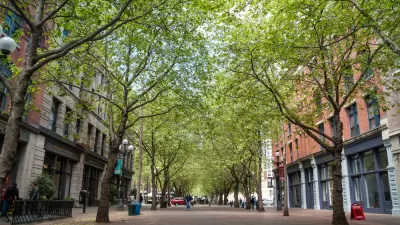A common refrain among environmentally-minded planners is: policy X will reduce global warming. So why would anyone be dumb enough to oppose policy X? But often, global warming will be the weakest, not the strongest, argument for policy X.
A common refrain among environmentally-minded planners is: policy X will reduce global warming. So why would anyone be dumb enough to oppose policy X?
But often, global warming will be the weakest, not the strongest, argument for policy X. Here's why: to get people to change their minds about policy X based on concerns about global warming, you have to persuade them that:
1. Global warming is real- a claim that are still controversial in some circles, and
2. Global warming is induced by carbon dioxide emissions (ditto) and
3. Global warming is so dangerous that it should affect your jurisdiction's policies (ditto), and
4. Policy X will reduce carbon dioxide emissions, and finally that
5. Even though global warming is a really serious crisis, policy X can reduce pollution enough to limit global warming.
All of these claims will be hard to prove, for the simple reason that all of them involve the kind of scientific issues that most ordinary citizens know little about. For example, you may want to argue that more walkable communities reduce pollution by reducing driving- but even if your opponents are willing to admit the seriousness of global warming (points 1-3 above), they may argue that faster, smoother traffic flow also reduces pollution by reducing congestion. How can the average scientifically illiterate citizen (or city councilperson) know who is right?
And even in a relatively pro-environmentalist state or city, point 5 may be a hard sell. For example, suppose you want your city to rezone land for higher density. You argue that more compact development means more walking, which mean less driving, which means less pollution, which means less global warming.
Opponents of your proposal may respond: if global warming is such a huge global problem, how is making our city slightly more walkable likely to matter? Won't your proposal give us the worst of both worlds, by giving us all the negative side effects of density without reducing pollution enough to affect a worldwide problem?
Of course, this doesn't mean you should never raise global warming as an argument for policies you favor; such an argument will resonate with the most environmentally-minded voters and policymakers. But global warming should never be your only argument.

Manufactured Crisis: Losing the Nation’s Largest Source of Unsubsidized Affordable Housing
Manufactured housing communities have long been an affordable housing option for millions of people living in the U.S., but that affordability is disappearing rapidly. How did we get here?

Americans May Be Stuck — But Why?
Americans are moving a lot less than they once did, and that is a problem. While Yoni Applebaum, in his highly-publicized article Stuck, gets the reasons badly wrong, it's still important to ask: why are we moving so much less than before?

Using Old Oil and Gas Wells for Green Energy Storage
Penn State researchers have found that repurposing abandoned oil and gas wells for geothermal-assisted compressed-air energy storage can boost efficiency, reduce environmental risks, and support clean energy and job transitions.

Updating LA’s Tree Rules Could Bring More Shade to Underserved Neighborhoods
A new USC study finds that relaxing Los Angeles’ outdated tree planting guidelines could significantly expand urban tree canopy and reduce shade disparities in lower-income neighborhoods, though infrastructure investments are also needed.

California's Canal Solar Projects Aim to Conserve Resources and Expand Clean Energy
California’s Project Nexus has begun generating electricity from solar panels installed over irrigation canals, with researchers and state agencies exploring statewide expansion to conserve water and boost clean energy production.

HHS Staff Cuts Gut Energy Assistance Program
The full staff of a federal program that distributes heating and cooling assistance for low-income families was laid off, jeopardizing the program’s operations.
Urban Design for Planners 1: Software Tools
This six-course series explores essential urban design concepts using open source software and equips planners with the tools they need to participate fully in the urban design process.
Planning for Universal Design
Learn the tools for implementing Universal Design in planning regulations.
Heyer Gruel & Associates PA
City of Moreno Valley
Institute for Housing and Urban Development Studies (IHS)
City of Grandview
Harvard GSD Executive Education
Salt Lake City
NYU Wagner Graduate School of Public Service
City of Cambridge, Maryland






























